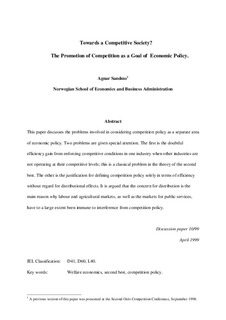| dc.contributor.author | Sandmo, Agnar | |
| dc.date.accessioned | 2006-08-15T10:35:58Z | |
| dc.date.available | 2006-08-15T10:35:58Z | |
| dc.date.issued | 1999-04 | |
| dc.identifier.issn | 0804-6824 | |
| dc.identifier.uri | http://hdl.handle.net/11250/162974 | |
| dc.description.abstract | This paper discusses the problems involved in considering competition policy as a separate area
of economic policy. Two problems are given special attention. The first is the doubtful
efficiency gain from enforcing competitive conditions in one industry when other industries are
not operating at their competitive levels; this is a classical problem in the theory of the second
best. The other is the justification for defining competition policy solely in terms of efficiency
without regard for distributional effects. It is argued that the concern for distribution is the
main reason why labour and agricultural markets, as well as the markets for public services,
have to a large extent been immune to interference from competition policy. | en |
| dc.format.extent | 52345 bytes | |
| dc.format.mimetype | application/pdf | |
| dc.language.iso | eng | en |
| dc.publisher | Norwegian School of Economics and Business Administration. Department of Economics | en |
| dc.relation.ispartofseries | Discussion paper | en |
| dc.relation.ispartofseries | 1999:10 | en |
| dc.subject | welfare economics | en |
| dc.subject | second best | en |
| dc.subject | competition policy | en |
| dc.title | Towards a competitive society? : the promotion of competition as a goal of economic policy | en |
| dc.type | Working paper | en |
